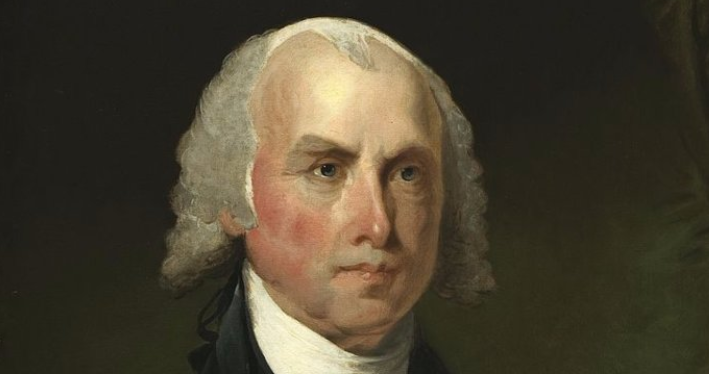Federalist #14 - James Madison - Federalist Fridays
In Federalist #14 James Madison discusses the common Anti-Federalist argument that the nation is too large for a Republican Government.
Before we get started, can I point out that in the picture above James Madison is 32, just four years away from writing the Federalist Papers. Notice how boyish he looks? He always looked like that, eventually earning the nickname ‘Little Jemmy Madison’ as President.
OK, now onto the good stuff…
Federalist #14
James Madison
November 30, 1787
Objections to the Proposed Constitution From Extent of Territory Answered
In Federalist #14, James Madison returns for his second installment.
In this essay, Madison counters one of the main Anti-Federalist arguments, that of the expanse of the United States being too big for Republican Government to work. This is a subject that Madison touched on briefly in Federalist #10 and Alexander Hamilton had discussed at some length in Federalist #9.
While this argument was proposed by many Anti-Federalists, Paper #14 seems to be in direct response to an article published by New York Governor (and future Vice-President to Madison) George Clinton.
Democracy v. Republic
Madison begins Paper #14 by claiming the Anti-Federalists are misinterpreting Montesquieu. He states:
“The error which limits republican government to a narrow district…seems to owe its rise and prevalence chiefly to the confounding of a republic with a democracy…”
He goes on to point out that a true democracy needs every citizen to participate equally in creating law and, therefore, can only work if the people are not required to travel a great distance. In a republic, however, the people send representatives to do the traveling for them.
The Size of the Nation
Madison next turns his attention to the proposal that the distance a delegate would need to travel would be much too great.
First, James notes that the Continental Congress had been meeting for well over a decade with representatives from the northernmost and southernmost States having relatively little issue with attendance.
Madison then decides to do a bit of boring calculation to determine that the current size of the United States is not that much different than many nations from Europe. Those same European nations seemed to have very little trouble attending sessions of their Parliaments.
Part National, Part Federal
Federalist #14 continues by demonstrating that the Constitution had been designed in such a way as to make sure it didn’t get too big for a Republic. This is done with Madison’s famous part-federal part-national system.
Basically, the National Government would only be responsible for certain issues that affect the whole. Meanwhile, the States would be left to govern anything that affects them specifically.
Under these circumstances, the nation would not grow too big.
Size Does Matter
Usually this is the part where I discuss the Anti-Federalist argument against a Federalist Paper. However, since this Paper is in itself a response to an Anti-Federalist argument, that seems silly.
Instead, I’d like to point your attention to how Madison actually describes the argument that the nation is too big as a positive good. He says:
“…the States which lie at the greatest distance from the heart of the Union, and which, of course, may partake least of the ordinary circulation of its benefits, will be at the same time immediately contiguous to foreign nations, and will consequently stand, on particular occasions, in greatest need of its strength and resources…”
James notes that the middle States are closer to centers of commerce. Meanwhile, the fringe States will need more border protection as they are more likely to be attacked from Native Americans and other Nations.
The Constitution will be beneficial as the frontier States will provide protection while the Middle States will increase the nation’s commerce.
Today I am going in a different direction and recommending you check out some of the more obscure Anti-Federalists who I have written about in the past: Timothy Bloodworth and John Lamb.
If you’d like to know the whole story of the Federalist Papers, I suggest you read ‘Triumvirate.’ I read this book several years ago and enjoyed it enough to reread it again last year. Pick up a copy through the affiliate link below to support this site at no additional cost to you.






